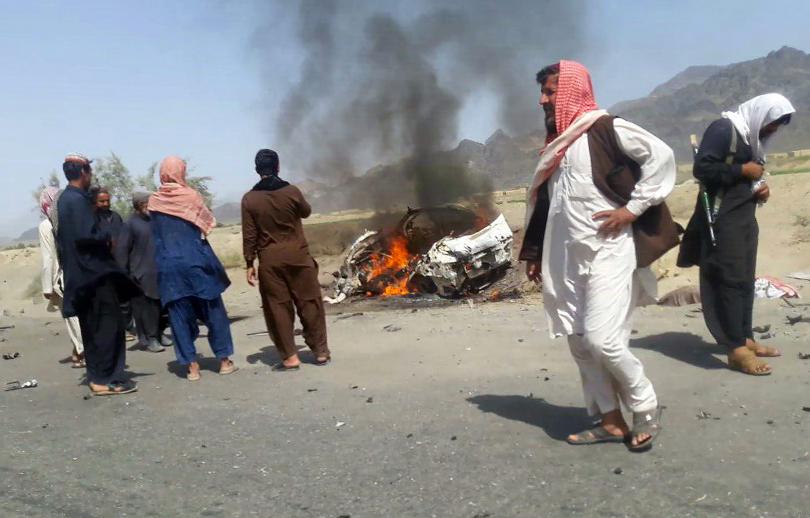
ISLAMABAD, May 23, 2016: Vice President PPP Senator Sherry Rehman called for a careful recalibration of Pakistan’s national security and foreign policy here today, asking the government to explain the delay by the Foreign Office to put out a clear statement on Pakistan’s position and the breach of sovereignty in a drone strike that allegedly killed Mullah Mansour. The Taliban chief’s reported killing on May 21, 2016 in Pakistan’s territory has not been confirmed by the Foreign Office of Pakistan.
“Whether the identification leads to confirmation or not, the episode still poses a number of key questions that place Pakistan in the crosshairs of a dangerous regional crisis as well as foreign policy flashpoint, where the United States is openly challenging Pakistan’s lawful writ by crossing red lines to extend drone strike attacks into Balochistan,” noted Rehman.
“The alleged presence and status of Mullah Mansour in Pakistan’s territory is also a matter of grave concern, especially if doubts remain about the space allowed to certain elements of the Afghan Taliban, who it seems are not amenable to the peace process so vigorously promoted by the government of Pakistan,” she added.
“The progress on Pakistan’s current land war against terrorism, needs to be urgently explained to Parliament by the Foreign Minister, who is currently the Prime Minister of Pakistan, and also by security officials who coordinate operational policy in an increasingly covertized, largely un-managed and contested border space between Afghanistan and Pakistan,” the Senator stated.
Rehman put forth the following questions to the government:
1. Given that the US had officially “informed” the PM of Pakistan after the drone act, it is clear that the government’s claims of an improving relationship with the United States are far from real or sanguine. In the backdrop of the loss of F 16 aircraft funding, and conditionalities applied to Pakistan’s behavior in the region, there is little doubt that Pakistan’s safety and security is being put at risk without discussion or transparency on vital policy choices in the Pak-Afghan regional equation, where the US has demonstrated its growing estrangement with Pakistan in unilateral actions and public messaging.
2. The drone strike is different from all others because it has not only resumed a genre of kinetic action that is unilateral, but also illegal and expansionary in its geographical theatre of targeted operation.
3. Documents ascribed to Mullah Mansour and a visa issued to travel to Iran also raise a host of questions about the level of covert activity in both Pakistan and Iran that must be explained to the people of Pakistan who pay the price both in terms of mortal blowback as well as damage to their collective national security, identity and international brand.
4. The government’s constant assurances to the public and parliament that the Quadrilateral Coordination Group is making progress is also questionable, given that key stakeholders such as Kabul in this group appear to be visibly angry, not least about their own lack of capacity to enforce any law or security in large swathes of Afghanistan, but also because of Pakistan’s continued inability to contain Afghan Taliban combatants when it allegedly houses some of the players, and at the same time continues to signal ability to bring warring leadership to the negotiating table. This overestimation and over-statement of state power on a group of Afghan Taliban actors who are making huge battlefield gains in Afghanistan has been clearly ruinous for Pakistan because it has put Islamabad squarely in the hot-seat as the responsible regional power for Taliban intrusions in Afghanistan, irrespective of non-collusion or ground reality.
5. The obvious gap between Pakistan’s alleged hedging of options in a conventionally challenging operational theatre, and its capacity to battle two sets of Taliban, both Pakistani and Afghan across a porous border, not to mention a number of proscribed militant outfits, must also be addressed by policy-makers, as at an international level this is causing egregious damage to the country and its reputation. Pakistan is being singled out for taking the fall for leading a collapsing road-map for Afghan peace when no other player in the QCG group appears to have answers, and the consequences are already playing out as unintended yet dangerous for Pakistan.
“The fragility of this border, continued Afghan refugee position, the public policy confusion, and diminishing space for Pakistan to invest in a peaceful, stable region seem to be leading Pakistan into a perfect strategic storm with Afghanistan as well as a non-NATO ally, the United States of America,” Rehman said.
“Given that no country can afford to live in global isolation in this connected century, and Pakistan could be headed in this direction if the policy wheel is subject to continued strategic drift, it is imperative that the people of Pakistan are given answers,” she concluded.

